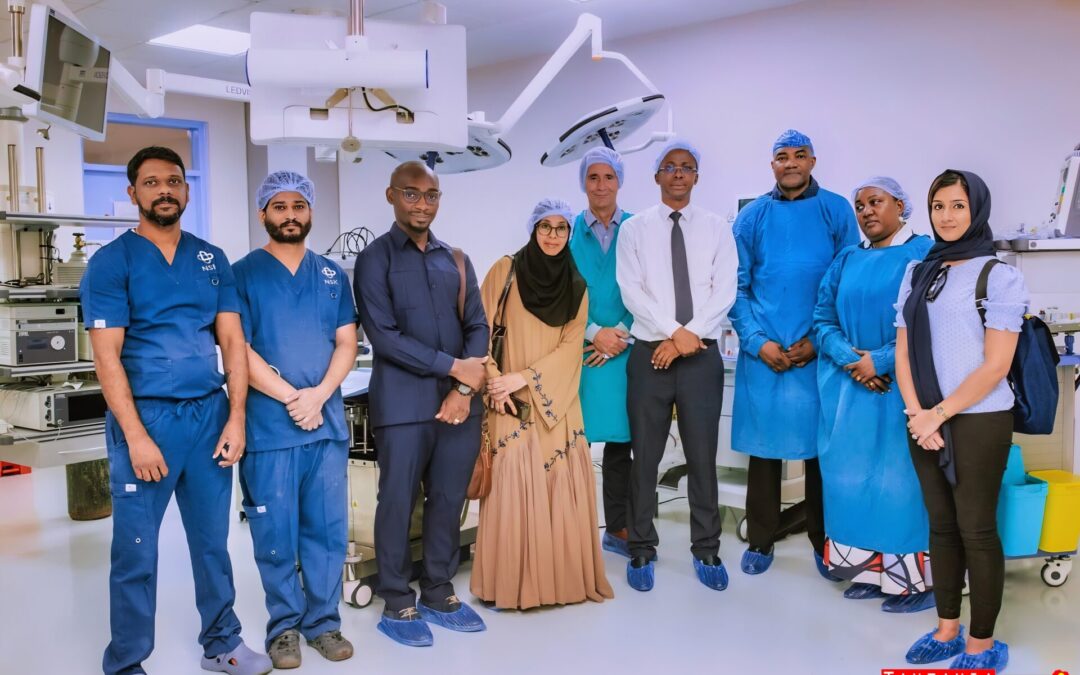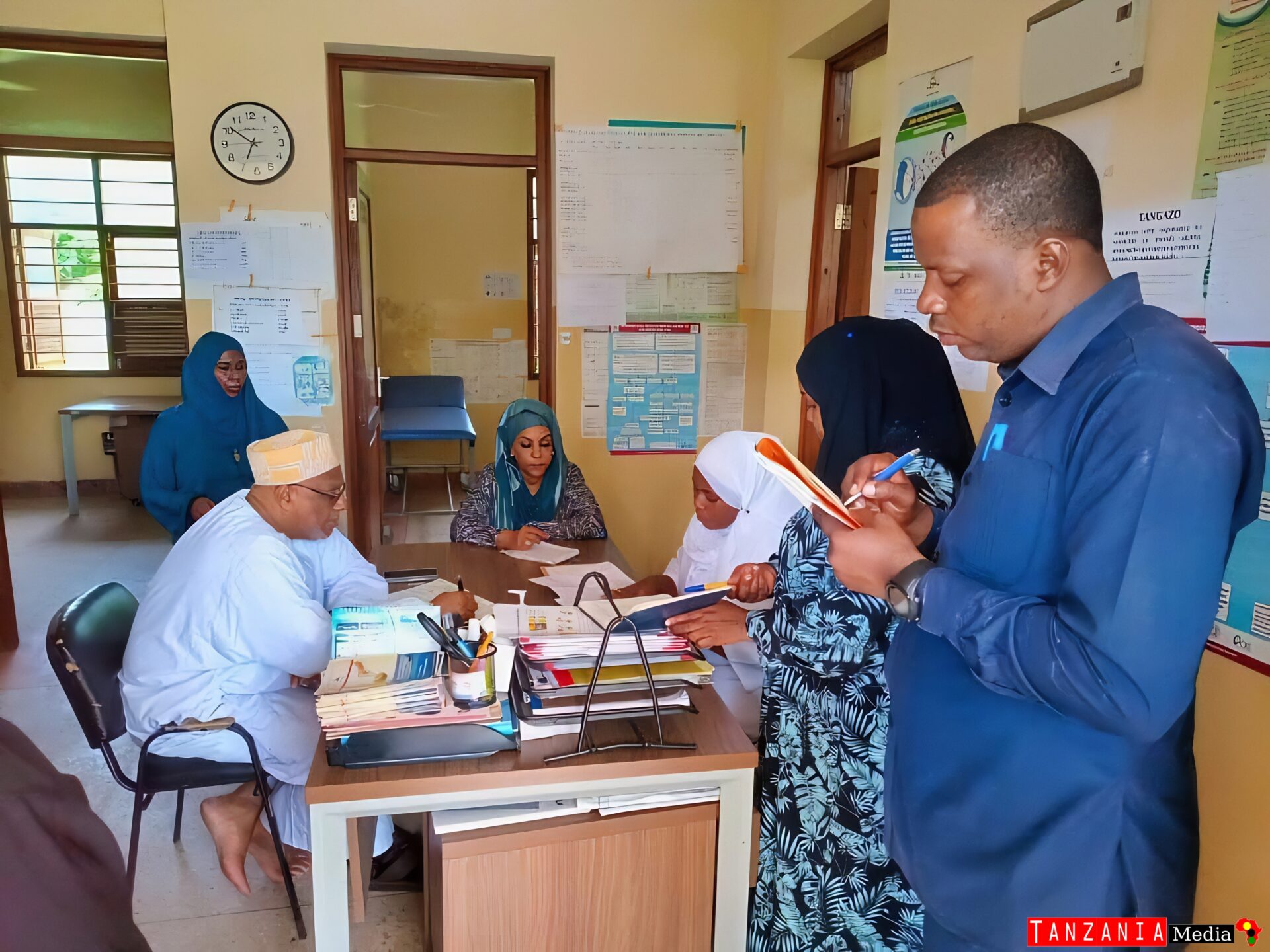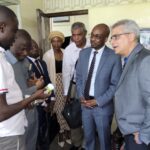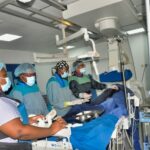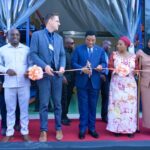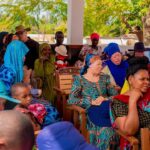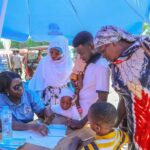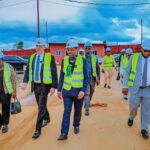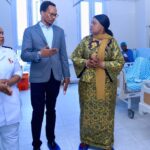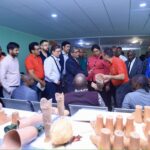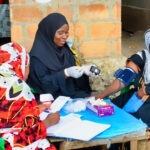Zanzibar’s Path to Universal Health Coverage: Challenges, Innovations, and Hope
Nestled in the azure waters of the Indian Ocean, Zanzibar is renowned for its breathtaking landscapes, rich cultural heritage, and vibrant communities. Yet beneath its idyllic surface lies a pressing challenge: ensuring equitable access to quality healthcare for all its residents. From bustling urban hospitals in Stone Town to remote rural clinics in Marumbi and Uroa, the archipelago’s healthcare system grapples with chronic shortages, geographic isolation, and climate vulnerabilities. However, amidst these challenges emerges a story of resilience, innovation, and hope.
Recent inspections led by Mr Nassor Ahmed Mazrui, Zanzibar’s Health Minister, alongside Dr Mngereza Mzee Miraji, Permanent Secretary of the Ministry of Health, have shed light on both the triumphs and trials of the island’s medical infrastructure. Their visits to 11 health centres across Unguja revealed critical gaps—such as overcrowded facilities, unreliable electricity, and midwifery shortages—but also showcased transformative initiatives like state-of-the-art laparoscopic theatres, mobile clinics, and community-driven outreach programs. These efforts underscore Zanzibar’s commitment to modernising its healthcare system while addressing the unique needs of its diverse population.
As the nation strives toward universal health coverage, stakeholders are embracing innovative solutions such as public-private partnerships, climate-resilient designs, and preventive care strategies. By prioritising vaccination drives, nutrition programs, and telemedicine, Zanzibar is tackling immediate healthcare needs and laying the foundation for a sustainable future. This journey is far from easy, but with visionary leadership, collaborative action, and unwavering determination, Zanzibar is proving that progress is possible even in resource-constrained settings.
The Importance of On-the-Ground Inspections: A Catalyst for Change in Zanzibar’s Healthcare System
In the enchanting yet complex archipelago of Zanzibar, where healthcare needs are as diverse as its people and geography, the recent on-the-ground inspections conducted by Mr Nassor Ahmed Mazrui, the Health Minister, have shone a spotlight on an often-overlooked truth: meaningful progress in healthcare cannot be achieved from behind the polished veneer of an office desk. By immersing himself in the realities of frontline healthcare workers and patients across 11 health centres—including Mwera Pongwe, Ndijani, Muembe Punda, and others—Mr Mazrui has demonstrated a refreshing brand of leadership that prioritises action over rhetoric.
During these visits, he witnessed scenes that no report or spreadsheet could fully capture: overcrowded waiting rooms filled with anxious mothers clutching feverish children; nurses stretched thin as they juggled multiple roles due to chronic understaffing; and outdated equipment struggling to meet the demands of modern medicine. At Dunga Health Centre, for instance, Mr Mazrui spoke with a senior nurse who explained how frequent power outages disrupted critical procedures, leaving both staff and patients in limbo. Such firsthand encounters provided invaluable insights into the systemic challenges plaguing Zanzibar’s healthcare infrastructure. This approach is not merely symbolic—it embodies participatory governance, ensuring that policies are crafted based on lived experiences rather than theoretical assumptions.
Why On-the-Ground Inspections Matter
The significance of such inspections cannot be overstated. They serve several vital functions:
- Humanising Policy-Making : When decision-makers step into the shoes of those delivering or receiving care, they gain a more in-depth understanding of the human impact of policy decisions. For example, hearing directly from a midwife about the struggles of performing deliveries without adequate lighting fosters empathy and urgency.
- Identifying Root Causes : Reports may highlight broad trends, but they rarely delve into the nuances of specific locations. During his visit to Marumbi, Mr Mazrui discovered that poor road conditions exacerbated delays in transporting emergency cases to larger hospitals—a detail that might otherwise have gone unnoticed.
- Building Trust : These visits also send a powerful message to communities: their voices matter. In Uroa, villagers expressed relief that someone in authority had finally taken note of their concerns about water shortages at the local clinic.
- Driving Accountability : Inspections create a sense of accountability among facility managers and staff, encouraging them to address glaring issues proactively.
Addressing Counterarguments
Critics, however, are quick to dismiss such tours as nothing more than photo opportunities designed to bolster political reputations. Indeed, if left unaccompanied by concrete follow-up actions, there is a risk that these visits could devolve into empty gestures. However, what sets this initiative apart is the commitment to translate observations into tangible outcomes?
For instance, following his tour, Mr Mazrui announced plans to allocate additional funding for essential medical supplies and recruit more healthcare professionals to alleviate staffing pressures. Similarly, Dr Mngereza Mzee Miraji’s inspection of the Laparoscopic Theatre (Pa1) underscored the government’s willingness to invest in cutting-edge solutions while addressing operational bottlenecks. These steps demonstrate that the inspections were not performative but part of a broader strategy to effect lasting change.
Moreover, history offers compelling evidence of the transformative power of hands-on leadership. In 2005, Rwanda’s then-Minister of Health, Dr Agnes Binagwaho, embarked on similar grassroots visits, which laid the foundation for one of Africa’s most remarkable healthcare turnarounds. Her efforts led to significant reductions in maternal mortality rates and improved access to primary care—proof that when leaders engage directly with the field, real progress follows.
A Blueprint for Success
To ensure these inspections yield maximum impact, it is crucial to institutionalise best practices. Regular feedback loops between central authorities and local facilities can help monitor progress and identify emerging challenges. Additionally, involving independent observers—such as civil society groups or international partners—can enhance transparency and guard against tokenism.
Ultimately, Mr Mazrui’s visits represent more than just a series of stops at health centres scattered across Unguja. They embody a philosophy of leadership that values proximity to the problem as much as proximity to the solution. In a place like Zanzibar, where resources are finite but aspirations are boundless, this approach holds immense promise. It reminds us that improving healthcare is not just about grand declarations or flashy equipment—it begins with listening, learning, and leading by example.
As the island nation continues its quest for universal health coverage, the lessons gleaned from these inspections will undoubtedly shape the path forward. After all, true transformation starts where the rubber meets the road—or, in this case, where the minister meets the patient.
Challenges Facing Rural Health Centres: The Struggle for Equity in Zanzibar’s Healthcare System
In the picturesque yet challenging rural landscapes of Zanzibar, where coconut palms sway gently against a backdrop of azure skies and rolling hills, lies a stark reality that often escapes the headlines. For residents of villages like Marumbi and Uroa, accessing even the most basic healthcare services can feel like an insurmountable challenge. During his recent tour of rural health centres, Mr Nassor Ahmed Mazrui shed light on the myriad hurdles these communities face—hurdles that underscore the deep inequities between urban and rural healthcare delivery in Zanzibar.

Geographic Isolation and Infrastructure Gaps
One of the most pressing issues highlighted during Mr Mazrui’s visits was geographic isolation. Many rural health centres are located far from major towns, making it difficult for patients to reach them—and vice versa when emergency referrals are needed. At Marumbi Health Centre, for example, the minister learned that ambulances frequently broke down due to poor road conditions, leaving critically ill patients stranded. Even when transport is available, the journey to urban hospitals such as Mnazi Mmoja in Stone Town can take hours, delaying treatment and worsening outcomes.
Compounding this issue is the lack of essential infrastructure within the facilities themselves. Mr Mazrui noted that several rural clinics, including those in Uroa and Ndijani, operate without reliable electricity or clean water—a situation that severely compromises their ability to provide safe and effective care. In one instance, he observed nurses at Muembe Punda Health Centre using flashlights to assist with nighttime deliveries because the power supply had failed yet again. Similarly, the absence of running water forces staff to rely on erratic rainwater collection systems, raising concerns about hygiene and infection control.
These deficiencies hinder service delivery and erode trust in the healthcare system. When villagers perceive their local clinics as inadequate, they are more likely to delay seeking care until conditions become life-threatening—or worse, turn to unqualified practitioners or traditional healers. This cycle perpetuates preventable illnesses and places an undue burden on already overstretched urban hospitals.
Targeted Investment: A Path to Bridging the Gap
Addressing these disparities requires nothing short of targeted investment in rural infrastructure. Mr Mazrui repeatedly emphasized this point during his engagements, advocating for measures such as upgrading roads, installing solar-powered generators, and constructing boreholes to ensure consistent access to clean water. He also called for increased funding to equip rural facilities with essential medical supplies and diagnostic tools, arguing that proximity to quality care should not depend on where one lives.
For instance, introducing telemedicine services in remote areas could revolutionize how patients interact with specialists based in urban centres. By leveraging technology, doctors in Stone Town could consult with rural practitioners in real-time, reducing the need for long-distance travel while improving diagnostic accuracy. Such innovations would go a long way toward levelling the playing field between urban and rural healthcare.
An Alternative Perspective: Prioritizing Urban Hospitals
While the case for investing in rural health centres is compelling, some critics argue that prioritizing urban hospitals offers quicker and more cost-effective results. Urban areas, after all, tend to have higher population densities, meaning improvements there can benefit larger numbers of people in a shorter timeframe. For example, enhancing surgical capacity at Mnazi Mmoja Hospital could save countless lives across the region by addressing complex cases that rural clinics simply cannot handle.

Furthermore, urban hospitals often serve as referral points for rural patients, making them critical nodes in the broader healthcare network. Strengthening these hubs could indirectly improve outcomes for rural populations by ensuring timely interventions when emergencies arise. From this perspective, directing limited resources toward urban facilities might seem like a pragmatic choice.
Striking a Balance: A Delicate Task for Policymakers
The debate over whether to prioritize urban or rural healthcare is emblematic of the delicate balancing act facing policymakers in Zanzibar. On one hand, neglecting rural areas risks entrenching existing inequalities and alienating large segments of the population. On the other, failing to bolster urban hospitals could overwhelm the system, leading to cascading failures that ultimately harm everyone.
To navigate this complexity, a dual-track approach may be necessary. Immediate investments in urban hospitals—such as procuring advanced equipment or expanding specialist departments—should be complemented by sustained efforts to uplift rural facilities. For example, partnerships with non-governmental organizations (NGOs) and international donors could help fund projects aimed at electrifying rural clinics or training community health workers. Meanwhile, policies promoting equitable distribution of healthcare professionals through incentives like housing allowances or loan forgiveness programs could encourage more doctors and nurses to work in underserved areas.
A Vision for Equitable Healthcare
Ultimately, the challenges facing rural health centres in Zanzibar are symptomatic of broader systemic issues rooted in historical underinvestment and resource constraints. Yet, they also present an opportunity to reimagine what equitable healthcare looks like in practice. By addressing geographic isolation, improving infrastructure, and fostering collaboration between urban and rural stakeholders, Zanzibar can build a healthcare system that leaves no one behind.
As Mr Mazrui concluded his visit to Uroa Health Centre, he left behind a poignant message for both staff and villagers: “Your well-being matters just as much as anyone else’s.” It is now up to policymakers, healthcare providers, and the wider community to turn those words into action. Only then can Zanzibar truly claim to offer universal health coverage—a promise that extends beyond the bustling streets of Stone Town to the quiet corners of Marumbi, Uroa, and beyond.
The Role of State-of-the-Art Equipment: A Leap Forward for Zanzibar’s Healthcare System
Amid the vibrant bustle of Zanzibar’s healthcare landscape, one moment during Mr Nassor Ahmed Mazrui’s inspection tour stood out as a beacon of progress. At Mnazi Mmoja Hospital in Stone Town, Dr Mngereza Mzee Miraji, the Permanent Secretary of the Ministry of Health, unveiled the newly acquired Laparoscopic Theatre (Pa1)—a gleaming testament to Zanzibar’s commitment to modernizing its healthcare infrastructure. This state-of-the-art facility, equipped with cutting-edge surgical tools designed for minimally invasive procedures, represents more than just a technological upgrade; it embodies hope for improved patient outcomes and a brighter future for medical care across the archipelago.
Transformative Potential of Advanced Technology
The introduction of laparoscopic equipment marks a significant leap forward in Zanzibar’s ability to deliver high-quality surgical care. Unlike traditional open surgeries, which often involve large incisions, prolonged recovery times, and higher risks of infection, laparoscopy allows surgeons to perform intricate operations through small keyhole cuts. This approach not only reduces post-operative pain but also shortens hospital stays and lowers the likelihood of complications—a boon for patients and an efficiency gain for overstretched health facilities.
For instance, conditions such as gallstones, hernias, and certain gynaecological disorders that previously required lengthy recoveries can now be treated with greater precision and speed. In a resource-constrained setting like Zanzibar, where hospital beds are scarce and waiting lists are long, these benefits cannot be overstated. The government’s decision to fund this initiative entirely underscores its determination to elevate standards of care and bring Zanzibar closer to global best practices.
Bridging the Skills Gap: A Lingering Concern
However, even the most advanced equipment is rendered ineffective without skilled hands to operate it. As Dr Miraji inspected the pristine machinery, questions lingered about whether local personnel had received adequate training to harness its full potential. While the installation of such technology is undoubtedly commendable, history offers cautionary tales about the pitfalls of neglecting capacity-building initiatives.
Take neighbouring Tanzania, for example. In 2018, several regional hospitals invested heavily in diagnostic imaging machines, only for them to gather dust due to a lack of trained radiographers. Similarly, in Uganda, expensive dialysis units were left idle because technicians lacked the expertise to maintain them. These examples highlight a critical lesson: technological advancements must go hand-in-hand with robust training programs if they are to yield meaningful results.
Building Capacity: Lessons from Abroad
Recognizing these challenges, Zanzibar has an opportunity to learn from both successes and failures elsewhere. Countries like Rwanda have demonstrated how investing in human capital can amplify the impact of new technologies. After procuring advanced laboratory equipment, Rwandan authorities partnered with international organizations to provide intensive training for laboratory technicians. They also established mentorship programs linking local staff with experienced professionals abroad. The result? A thriving network of skilled workers who could sustain and expand upon initial investments.
To ensure similar success, Zanzibar must adopt a multipronged strategy. First, comprehensive training workshops should be organized for surgeons, nurses, and biomedical engineers involved in operating and maintaining the laparoscopic theatre. These sessions could be facilitated by experts from partner institutions or donor countries, leveraging existing collaborations. Second, ongoing professional development opportunities—such as refresher courses and exchange programs—should be prioritized to keep skills up-to-date. Finally, establishing a dedicated support team to troubleshoot technical difficulties will prevent disruptions in service delivery.
Addressing Broader Implications
Beyond individual skill-building, the integration of advanced equipment into Zanzibar’s healthcare system raises broader questions about sustainability and equity. Will rural hospitals like those in Marumbi or Uroa benefit from similar upgrades, or will access to cutting-edge treatments remain confined to urban centres? Ensuring equitable distribution of resources will require careful planning and sustained investment.
Moreover, public awareness campaigns can play a vital role in familiarizing communities with the advantages of minimally invasive surgery. Many patients may initially hesitate to embrace unfamiliar techniques, preferring tried-and-tested methods. By demystifying laparoscopy and highlighting its benefits, healthcare providers can build trust and encourage wider adoption.
A Step Toward Self-Reliance
In the long term, embracing state-of-the-art equipment positions Zanzibar to reduce its reliance on costly referrals abroad—a common practice for complex cases that strain both individuals and the national budget. Imagine a future where residents no longer need to travel to Dar es Salaam or overseas for specialized care, saving time, money, and lives in the process. Achieving this vision hinges on striking the right balance between technology and training.
As Dr Miraji concluded his inspection, he remarked, “This is not just about acquiring machines; it’s about empowering our people to use them effectively.” His words encapsulate the dual challenge facing Zanzibar today: to modernize its healthcare system while equipping its workforce with the skills needed to thrive in a rapidly evolving field.
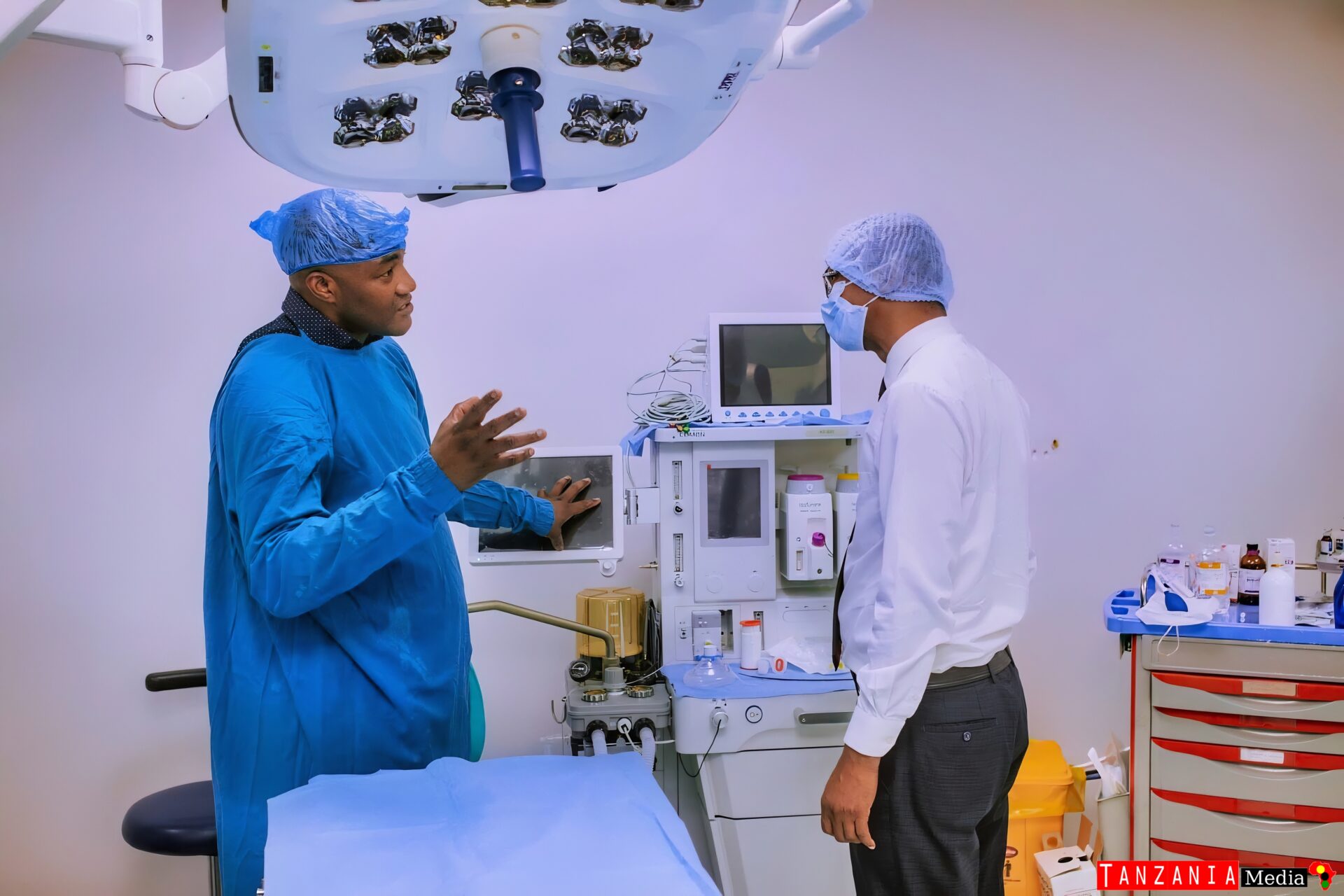
By addressing these concerns head-on, Zanzibar can transform its laparoscopic theatre from a symbol of aspiration into a cornerstone of accessible, high-quality care. And in doing so, it will set a powerful example for other nations navigating the delicate interplay between innovation and implementation.
Community Engagement and Trust-Building: The Heartbeat of Zanzibar’s Healthcare Transformation
In the sun-drenched villages of Zanzibar, where the rhythm of life is dictated by the tides and traditions passed down through generations, healthcare is not just a matter of policy—it is deeply personal. During his recent tour of health centres across Unguja, Mr Nassor Ahmed Mazrui demonstrated an unwavering commitment to fostering connections with the very people who depend on these services. At every stop, from Mwera Pongwe to Bambi Health Centre, he listened intently to the voices of villagers, acknowledging their concerns while celebrating their resilience. These interactions underscored a fundamental truth: building trust between healthcare providers and communities is as vital as any medical intervention.
Listening to the Voices of the People
At Bambi Health Centre, nestled in one of Zanzibar’s more remote corners, villagers gathered eagerly to share their experiences with Mr Mazrui. While they expressed heartfelt gratitude for ongoing maternal health programs—initiatives that have significantly reduced infant mortality rates—they also voiced a pressing issue: the chronic shortage of midwives. One elderly woman recounted how her daughter had nearly lost her newborn during childbirth because no skilled attendant was available at night. Such stories are not uncommon in rural areas, where staffing shortages often leave clinics understaffed and overburdened.
But it wasn’t just about numbers; it was about relationships. Many villagers spoke of lingering scepticism toward modern medicine, rooted in deeply ingrained cultural beliefs. For instance, traditional birthing practices remain prevalent in some communities, with families preferring home deliveries assisted by local birth attendants rather than seeking care at health facilities. This preference highlights the critical need for healthcare providers to engage meaningfully with communities, bridging gaps in understanding and fostering mutual respect.
Why Trust Matters
Trust is the foundation upon which effective healthcare systems are built. Without it, even the most advanced equipment or well-funded programs risk underutilization. In regions like Zanzibar, where traditional practices often intersect with modern medical interventions, gaining the confidence of local populations is particularly challenging yet essential. When villagers feel heard and respected, they are more likely to embrace preventive measures such as vaccinations, seek timely treatment for illnesses, and participate actively in public health campaigns.
For example, during the COVID-19 pandemic, community engagement played a pivotal role in dispelling myths and encouraging vaccine uptake. By involving local leaders and influencers in awareness drives, Zanzibar successfully countered misinformation and built widespread acceptance of vaccines—a testament to the power of dialogue and collaboration.
Strengthening Bonds Through Innovative Initiatives
To further solidify these bonds, innovative strategies tailored to the unique needs of Zanzibari communities must be prioritized. Mobile clinics, for instance, offer a practical solution to geographic isolation, bringing essential services directly to underserved areas. Equipped with basic diagnostic tools and staffed by dedicated healthcare workers, these clinics can address immediate needs while also serving as platforms for education and outreach.
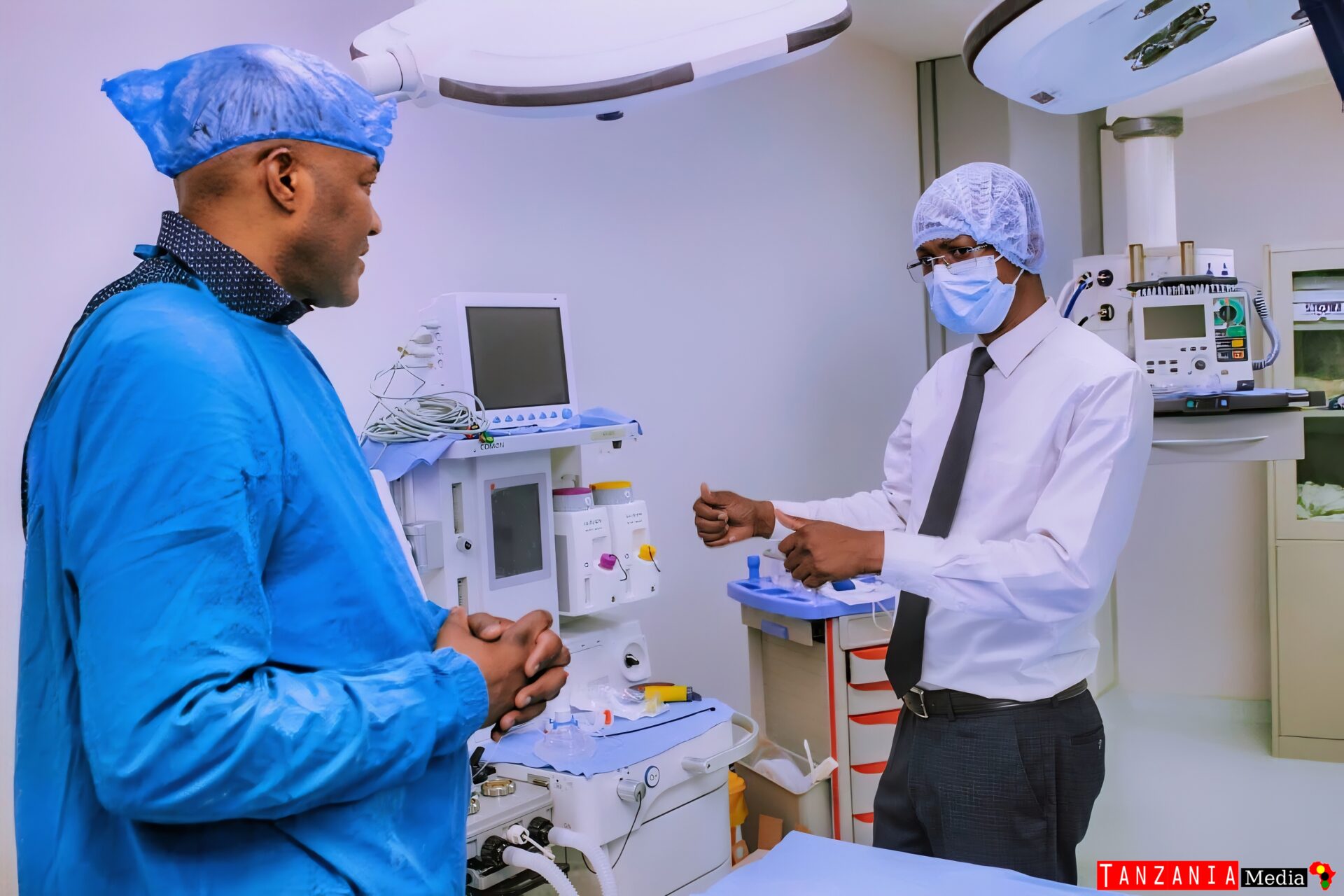
Awareness campaigns represent another powerful tool. By organizing workshops, distributing informational materials in Swahili, and leveraging radio broadcasts—a medium widely trusted across the islands—health authorities can demystify complex topics such as laparoscopic surgery or antenatal care. Including testimonials from satisfied patients who have benefited from modern treatments can further enhance credibility and encourage others to follow suit.
Addressing Cultural Sensitivities
A key aspect of community engagement lies in respecting and integrating traditional practices into modern healthcare frameworks. Rather than dismissing indigenous knowledge outright, healthcare providers should seek ways to harmonize it with evidence-based approaches. For instance, training traditional birth attendants alongside midwives could create a hybrid model that combines the best of both worlds, ensuring safer deliveries without alienating those who prefer familiar customs.
Similarly, involving religious and community leaders in health initiatives can amplify their reach and impact. In predominantly Muslim Zanzibar, imams hold significant influence and can play a transformative role in promoting behaviours such as family planning or hygiene practices. Their endorsement lends legitimacy to otherwise unfamiliar concepts, helping to shift attitudes over time.
Lessons from Success Stories
Zanzibar’s efforts mirror successful models seen elsewhere in Africa. In Ethiopia, the Health Extension Worker (HEW) program has revolutionized primary healthcare delivery by deploying trained workers to rural areas. These individuals act as intermediaries between formal health systems and local communities, addressing everything from sanitation to maternal health. Inspired by this approach, Zanzibar could consider expanding its cadre of community health workers, empowering them to serve as ambassadors of change within their neighbourhoods.
Closer to home, Tanzania’s “Fundi wa Afya” (Health Champions) initiative provides another blueprint. By identifying and training volunteers within villages, the program ensures continuous engagement and accountability at the grassroots level. Adopting similar tactics could help Zanzibar sustain momentum beyond high-profile visits like Mr Mazrui’s.
A Vision for Collaborative Healthcare
As Mr Mazrui departed Bambi Health Centre, he left behind a poignant reminder: “Our strength lies in our unity.” His words encapsulate the essence of community engagement—a shared journey toward better health outcomes. By listening to the concerns of villagers, addressing cultural sensitivities, and implementing targeted initiatives, Zanzibar can forge stronger ties between healthcare providers and the communities they serve.
Ultimately, trust-building is not a one-time effort but an ongoing process that requires patience, empathy, and persistence. It demands that policymakers view communities not as passive recipients of care, but as active partners in shaping the future of healthcare. Only then can Zanzibar hope to achieve universal health coverage—a vision where no one is left behind, regardless of geography, tradition, or circumstance.
Public-Private Partnerships: A Path Forward for Zanzibar’s Healthcare System?
In the quest to strengthen Zanzibar’s healthcare system, the government cannot—and should not—shoulder the burden alone. Addressing systemic challenges requires a multifaceted approach that leverages resources, innovation, and expertise from all available quarters. Public-private partnerships (PPPs) have emerged as a promising avenue for achieving this goal, offering a mechanism to bridge funding gaps and enhance service delivery in under-resourced areas. However, while PPPs hold immense potential, their implementation demands careful regulation to ensure that equity remains at the heart of Zanzibar’s healthcare transformation.
The Promise of PPPs in Zanzibar
Public-private partnerships are collaborative arrangements where the public sector partners with private entities—such as businesses, non-governmental organizations (NGOs), or philanthropic foundations—to deliver services or infrastructure. In the context of Zanzibar’s healthcare system, PPPs could address critical needs that government budgets alone struggle to meet.
Consider ambulance services, for instance. Many remote districts like Marumbi and Uroa lack reliable emergency transport due to poor road conditions and insufficient vehicles. Private donors or corporations could step in to fund the procurement and maintenance of ambulances, ensuring timely referrals for critically ill patients. Similarly, pharmaceutical companies might partner with the Ministry of Health to supply essential medicines at subsidized rates, reducing stock outs in rural clinics.
Another compelling example lies in telemedicine initiatives. With limited specialists available in rural areas, private tech firms could collaborate with health authorities to develop platforms connecting patients in places like Muembe Punda or Ndijani with doctors in urban centres such as Stone Town. Such innovations would improve access to care and reduce travel expenses for patients—a significant barrier for low-income families.
Complementing Public Sector Investments
The beauty of PPPs lies in their ability to complement rather than replace public sector investments. For instance, while the government focuses on constructing new health facilities or upgrading existing ones, private partners can provide ancillary support by equipping these centres with cutting-edge technology or training staff. This synergy ensures that taxpayer money is used efficiently, allowing the state to focus on its core mandate while leveraging external expertise for specialized tasks.
Moreover, PPPs can drive innovation. Private entities often bring fresh perspectives and entrepreneurial energy to problem-solving, which can catalyze improvements in efficiency and quality. For example, a partnership between a renewable energy company and rural health centres could result in solar-powered electricity systems, addressing persistent power shortages and enabling uninterrupted care even during outages.
Ensuring Equity Through Careful Regulation
Despite their promise, PPPs are not without risks. Critics rightfully caution that poorly designed partnerships may exacerbate inequalities if profit motives overshadow public interest. For instance, private hospitals operating in affluent areas might cherry-pick lucrative services, leaving underserved communities further marginalized. To prevent such outcomes, robust regulatory frameworks must be established to safeguard equity.
One way to achieve this is through transparent contracting processes. Agreements should clearly outline roles, responsibilities, and performance metrics to hold private partners accountable. Additionally, subsidies or incentives could be offered to encourage private entities to invest in rural or economically disadvantaged areas, where returns may be lower, but the need is greatest.
Zanzibar can also draw inspiration from successful PPP models elsewhere. In Kenya, the “Beyond Zero” campaign partnered with private donors to equip mobile clinics targeting maternal health in remote regions. Similarly, Rwanda’s collaboration with international NGOs has led to dramatic improvements in HIV/AIDS treatment coverage. By studying these examples, Zanzibar can design partnerships tailored to its unique context while avoiding common pitfalls.
Balancing Profit and Purpose
A recurring concern with PPPs is the tension between profitability and public service. While private entities naturally seek financial sustainability, healthcare is fundamentally a social good—not a commodity. Striking the right balance requires creative solutions. For example, hybrid models combining fee-for-service structures with subsidized care for vulnerable populations could ensure affordability without deterring private investment.
Community involvement is another crucial factor. Engaging local leaders and residents in designing and monitoring PPPs can help align projects with community priorities, fostering ownership and accountability. At Bambi Health Centre, villagers expressed enthusiasm for a proposed partnership with a local business to fund midwifery training programs—an initiative likely to succeed because it directly addresses a pressing need identified by the community itself.
A Catalyst for Sustainable Development
When executed thoughtfully, PPPs can serve as a catalyst for sustainable development in Zanzibar’s healthcare system. Beyond immediate benefits, they can foster long-term resilience by creating self-sustaining models of care. For instance, partnerships with agricultural cooperatives could promote nutrition programs aimed at preventing malnutrition—a root cause of many health issues. Likewise, collaborations with educational institutions could establish pipelines for training future healthcare professionals, addressing chronic staffing shortages.
Looking Ahead: Toward Collaborative Leadership
As Mr Nassor Ahmed Mazrui reflected during his tour, “No single entity holds all the answers; together, we can achieve what none of us could do alone.” His words encapsulate the spirit of collaboration needed to propel Zanzibar’s healthcare forward. By embracing PPPs as a strategic tool, Zanzibar can unlock new avenues for progress while upholding its commitment to equitable, accessible care for all.
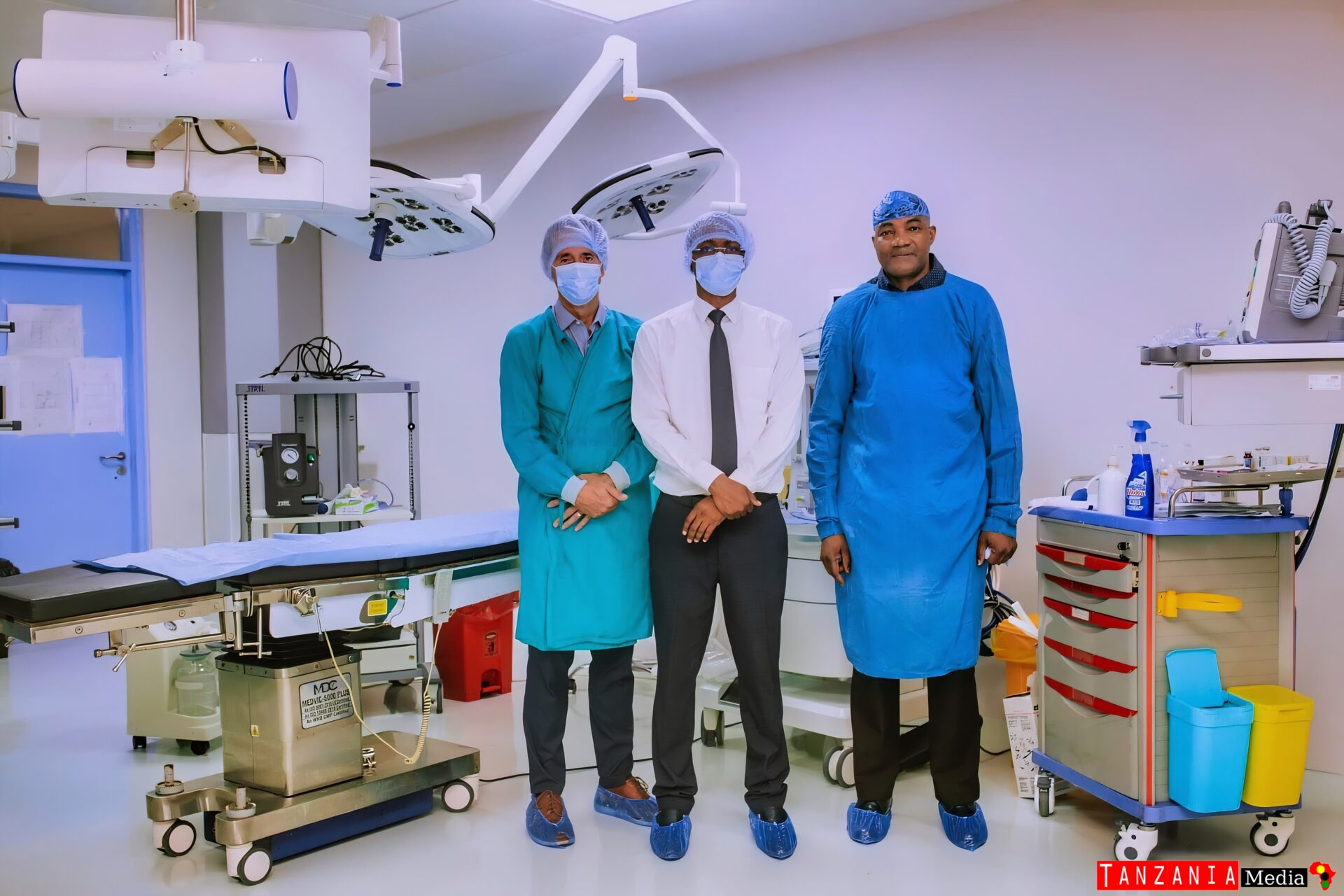
However, success will hinge on vigilance and foresight. Policymakers must remain steadfast in prioritizing public welfare over private gain, crafting agreements that reflect the values and aspirations of Zanzibari society. Only then can PPPs fulfil their transformative potential, paving the way for a healthier, more resilient Zanzibar—one where every villager, whether in bustling Stone Town or the serene hills of Chwaka, has access to the care they deserve.
Sustainability and Long-Term Vision: Building a Resilient Healthcare System in Zanzibar
In the face of pressing healthcare challenges, it is tempting to focus solely on immediate fixes—patching up dilapidated facilities, replenishing dwindling medical supplies, or hiring temporary staff to address acute shortages. While such measures are undoubtedly necessary, they represent only a fraction of what is required to create a truly sustainable healthcare system. For Zanzibar, where resources are limited and vulnerabilities to environmental shocks are growing, long-term planning must take centre stage. By investing in preventive care and designing climate-resilient infrastructure, Zanzibar can not only reduce the burden on its curative services but also future-proof its healthcare system against an uncertain tomorrow.
The Power of Preventive Care
Prevention, as the adage goes, is better than cure—and nowhere is this truer than in resource-constrained settings like Zanzibar. Curative services, while essential, place immense strain on already overstretched hospitals and clinics. By shifting the focus upstream to preventive care, the government can reduce the incidence of preventable diseases, freeing up resources for more complex cases.
Vaccination drives stand out as a prime example of this approach. Immunization programs have proven to be one of the most cost-effective public health interventions globally, saving millions of lives annually. In Zanzibar, campaigns targeting measles, polio, and other infectious diseases have yielded remarkable results, significantly reducing child mortality rates. Yet, there is room to expand these efforts, particularly in hard-to-reach areas like Marumbi and Uroa, where logistical challenges often hinder coverage. Strengthening cold chain systems—perhaps through solar-powered refrigeration units—could ensure vaccines remain viable even in remote locations.
Nutrition programs offer another avenue for prevention. Malnutrition remains a persistent issue in Zanzibar, contributing to stunted growth in children and increasing susceptibility to illnesses such as malaria and diarrhoea. Collaborations with local agricultural cooperatives could promote community gardens, teaching families how to grow nutrient-rich crops like sweet potatoes and moringa. Coupled with educational initiatives about balanced diets, these efforts could lay the foundation for healthier generations, reducing the need for costly treatments down the line.
Climate-Resilient Health Infrastructure
As global temperatures rise and extreme weather events become more frequent, Zanzibar’s healthcare facilities must adapt to withstand environmental shocks. Rising sea levels threaten coastal clinics, while heavy rains and flooding can damage roads, disrupt supply chains, and render buildings unusable. During his tour, Mr Nassor Ahmed Mazrui highlighted the urgent need to integrate climate-resilient designs into new health infrastructure—a move that aligns with broader national strategies to combat climate change.
What might this look like in practice? For starters, new facilities could be constructed on elevated platforms to protect against storm surges and tidal flooding. Roofs designed to harvest rainwater would mitigate water shortages during dry spells and provide a reliable source for hygiene and sanitation. Solar panels, already gaining traction in rural clinics like Mwera Pongwe, could ensure uninterrupted power supply even during grid failures caused by storms. Additionally, using locally sourced, durable materials would enhance structural integrity while supporting the local economy.
Retrofitting existing facilities is equally important. At Dunga Health Centre, for instance, reinforcing walls and installing drainage systems could prevent water ingress during monsoon seasons. Similarly, equipping ambulances with all-terrain capabilities would enable them to navigate flooded or eroded roads, ensuring continuity of emergency services when they are needed most.
A Holistic Approach to Sustainability
Sustainability extends beyond physical infrastructure; it encompasses human capital, financial stewardship, and community empowerment. Training healthcare workers in disaster preparedness, for example, ensures they can respond effectively to crises without relying solely on external aid. Simulation exercises mimicking scenarios like cyclones or disease outbreaks could build resilience within the workforce, enabling them to act swiftly and confidently under pressure.
Financial sustainability is another critical dimension. While donor funding has played a vital role in Zanzibar’s healthcare development, over-reliance on external support poses risks. Diversifying revenue streams—through mechanisms such as social insurance schemes or modest user fees for non-essential services—could help cushion the system against fluctuations in international aid. Importantly, any fee-based model must include exemptions for vulnerable groups to preserve equity.
Community involvement further reinforces sustainability by fostering ownership and accountability. Villagers who participate in building or maintaining their local health centres are more likely to value and protect those assets. At Chwaka Health Centre, for example, residents recently volunteered to plant mangroves along the shoreline, both stabilizing the soil and safeguarding the facility from erosion. Such grassroots efforts demonstrate the power of collective action in creating lasting change.
Learning from Global Best Practices
Zanzibar can draw valuable lessons from other nations grappling with similar challenges. Bangladesh, for instance, has pioneered floating clinics that bring healthcare directly to communities isolated by floods—a concept worth exploring for Zanzibar’s coastal regions. Meanwhile, Cuba’s emphasis on preventive medicine and universal primary care offers a blueprint for reducing reliance on expensive hospital-based treatments. By adapting these models to its unique context, Zanzibar can chart a path toward greater self-reliance and resilience.
Looking Beyond the Horizon
The decisions made today will shape Zanzibar’s healthcare landscape for decades to come. Immediate fixes may alleviate symptoms, but true transformation requires a vision that stretches far into the future. By prioritising preventive care, embracing climate-resilient designs, and empowering communities, Zanzibar can build a healthcare system capable of withstanding both current demands and emerging threats.
As Mr Mazrui concluded his tour, he reminded stakeholders that sustainability is not merely an aspiration—it is a responsibility. “We owe it to our children and grandchildren,” he said, “to leave behind a legacy of health and hope.” With unwavering commitment and strategic foresight, Zanzibar can fulfill this promise, ensuring that every resident, regardless of geography or circumstance, enjoys access to quality care now and in the years to come.
A Beacon of Hope Amid Challenges: Celebrating Progress in Zanzibar’s Healthcare Journey
In the face of formidable challenges, it is easy to become disheartened by the enormity of the task ahead. Yet, amidst the struggles and setbacks, there are glimmers of hope—moments that remind us of the resilience, ingenuity, and determination embedded within Zanzibar’s healthcare system. These stories of triumph, often born out of adversity, serve as powerful reminders that progress is not only possible but already underway. From the tireless dedication of healthcare workers to innovative government-led initiatives, Zanzibar is steadily carving a path toward a healthier and more equitable future.
The Unsung Heroes: Healthcare Workers
At the heart of Zanzibar’s healthcare success stories are its frontline workers—nurses, midwives, doctors, and community health volunteers who show up day after day, often under difficult circumstances, to care for their fellow citizens. Their unwavering commitment transcends the limitations imposed by resource constraints. At Dunga Health Centre, for instance, a team of nurses worked tirelessly through power outages, using flashlights and headlamps to ensure that no patient was turned away. Such acts of dedication underscore the profound sense of duty that drives these professionals, even when the odds seem insurmountable.
These individuals are not just caregivers; they are innovators. Faced with shortages of essential supplies, many have devised creative solutions to keep services running. In Marumbi, a group of midwives trained local women to make reusable sanitary pads, addressing menstrual hygiene needs while empowering the community economically. Similarly, at Muembe Punda Health Centre, staff collaborated with villagers to construct a rainwater harvesting system, ensuring a steady supply of clean water despite erratic rainfall patterns. These grassroots innovations highlight the transformative potential of human ingenuity when coupled with a steadfast commitment to service.
Strategic Government Interventions: Lighting the Way Forward
The role of strategic government interventions cannot be overstated in fostering hope and driving change. Across Zanzibar, targeted programs have yielded tangible results, demonstrating that thoughtful planning and execution can overcome significant barriers. One shining example comes from Chwaka Health Centre, where an innovative outreach program has significantly boosted immunization rates. By deploying mobile clinics and partnering with village elders to spread awareness about the importance of vaccines, the centre achieved near-universal coverage in areas once considered hard-to-reach.
This success did not happen by chance. It was the result of careful coordination between health authorities, community leaders, and international partners. For instance, the Ministry of Health provided logistical support, including cold chain equipment, while local influencers helped dispel myths surrounding vaccinations. The outcome speaks for itself: fewer outbreaks of preventable diseases and healthier children growing up to contribute to their communities.
Chwaka’s story is emblematic of what can be achieved when stakeholders align their efforts toward a common goal. It also serves as a blueprint for other regions facing similar challenges. Whether it’s tackling maternal mortality in Uroa or improving sanitation in Bambi, the principles remain the same: collaboration, innovation, and perseverance.
Progress in Resource-Constrained Settings
Stories like those emerging from Chwaka challenge the notion that progress is impossible without abundant resources. While Zanzibar may lack the financial means of wealthier nations, it compensates with creativity, adaptability, and sheer willpower. Take, for example, the introduction of solar-powered lighting systems in rural clinics—a cost-effective solution that has transformed nighttime deliveries and emergency procedures. Or consider the use of bicycles by community health workers to reach remote households, ensuring no one is left behind.
Such initiatives prove that impactful change does not always require vast sums of money; sometimes, it simply requires embracing innovative approaches. By leveraging available assets—whether human, technological, or natural—Zanzibar continues to defy expectations and deliver results.
Inspiring Confidence in the Future
These achievements do more than improve statistics; they inspire confidence in the possibility of lasting change. When villagers see improvements in their local health centres, they begin to trust the system and actively participate in its success. This virtuous cycle creates momentum, encouraging further investment and engagement from all levels of society.
Mr Nassor Ahmed Mazrui captured this sentiment perfectly during his visit to Chwaka: “Every life saved, every illness prevented, is a testament to our collective ability to rise above challenges.” His words reflect a broader truth—that hope is not passive; it is active, rooted in action and achievement. Each immunized child, each renovated clinic, and each trained healthcare worker represents a step forward on the long road to universal health coverage.
Lessons for the Wider World
Zanzibar’s journey holds lessons not just for its own people but for the global community. In an era defined by uncertainty and inequality, the archipelago’s experiences demonstrate that meaningful progress is achievable even in the most constrained environments. By prioritizing prevention over cure, engaging communities as partners, and embracing innovation, Zanzibar offers a model of resilience that others can emulate.
Moreover, these successes remind us of the importance of celebrating small victories along the way. Too often, we focus solely on the destination, forgetting to acknowledge the milestones reached en route. Recognizing and amplifying stories of progress—not just in Zanzibar, but worldwide—can galvanize support and sustain motivation in the pursuit of better healthcare for all.
A Legacy of Hope
As the sun sets over the Indian Ocean, casting its golden glow across Zanzibar’s shores, one cannot help but feel a renewed sense of optimism. Despite the obstacles, the island nation is proving that hope is not a luxury reserved for the privileged—it is a right for every individual, regardless of geography or circumstance.
From the bustling corridors of Mnazi Mmoja Hospital to the quiet corners of rural health centres, the spirit of progress permeates every level of Zanzibar’s healthcare system. It is a spirit fuelled by the dedication of its people, the vision of its leaders, and the belief that a healthier tomorrow is within reach. As Zanzibar continues its journey, let its stories of triumph inspire us all to strive for a world where quality healthcare is not an exception but a norm—a beacon of hope shining brightly against the darkness of despair.
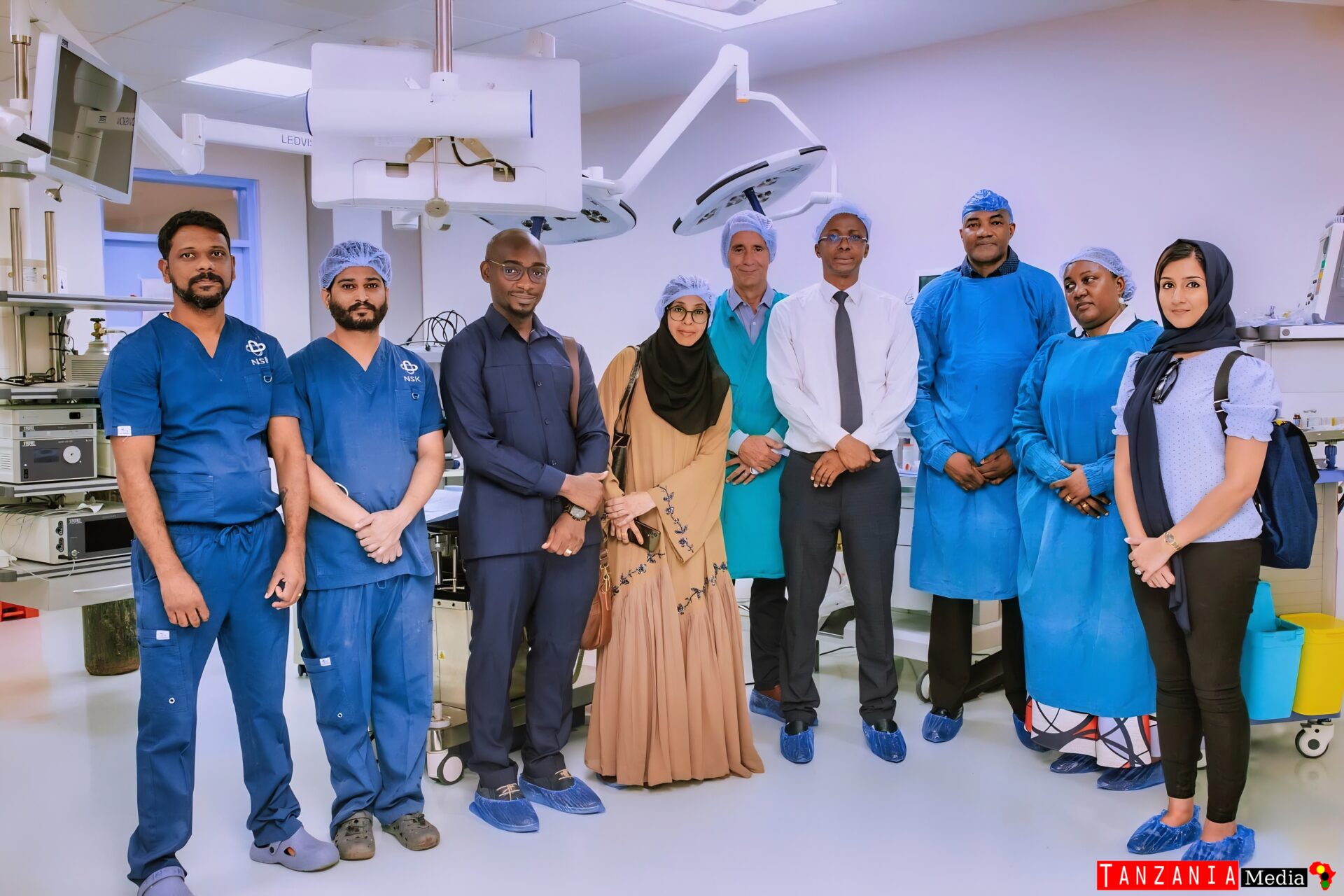
Conclusion: Toward a Healthier Zanzibar
As the sun dips below the horizon, painting Unguja’s verdant hills and tranquil shores in hues of gold and crimson, one truth emerges with crystalline clarity: Zanzibar stands at a pivotal juncture. The recent inspections led by Mr Nassor Ahmed Mazrui and Dr Mngereza Mzee Miraji have illuminated both the resilience and fragility of the archipelago’s healthcare system. These visits revealed not only the profound challenges faced by health centres across the island, but also the remarkable potential for transformation when leadership, innovation, and community spirit converge. To navigate this crossroads successfully, stakeholders must adopt a holistic approach—one that addresses deep-rooted structural weaknesses while seizing opportunities for sustainable growth.
A Dual Mandate: Strengthening Foundations and Embracing Innovation
The path forward requires a dual mandate. On one hand, there is an urgent need to shore up the foundations of Zanzibar’s healthcare system. This means tackling chronic issues such as staff shortages, outdated equipment, and inadequate infrastructure in rural areas like Marumbi and Uroa. Ensuring reliable access to clean water, electricity, and essential medical supplies must remain a top priority if primary care is to be delivered effectively. Without these basics in place, even the most ambitious reforms risk faltering under the weight of unmet needs.
On the other hand, Zanzibar must embrace innovation to leapfrog traditional barriers and accelerate progress. The introduction of state-of-the-art equipment like the Laparoscopic Theatre (Pa1) demonstrates what can be achieved when technology meets commitment. However, such advancements must be accompanied by robust training programs and maintenance plans to ensure their longevity. Similarly, initiatives like telemedicine and mobile clinics hold immense promise for bridging geographic divides, bringing quality care to remote corners of the island where it is needed most. By balancing foundational improvements with forward-thinking strategies, Zanzibar can create a healthcare system that is both resilient and responsive.
Collaboration: The Key to Success
No single entity can shoulder the responsibility of transforming healthcare alone. Achieving universal health coverage demands collaboration across sectors—government ministries, private enterprises, civil society organizations, international partners, and local communities all have vital roles to play. Public-private partnerships (PPPs), for example, could unlock new funding streams and expertise, enabling projects such as ambulance services in rural districts or renewable energy solutions for off-grid clinics. Meanwhile, engaging community leaders and residents ensures that interventions are culturally appropriate and widely accepted, fostering trust and participation.
This collaborative ethos extends beyond Zanzibar’s borders. As part of the global effort to achieve Sustainable Development Goal 3 (Good Health and Well-being), the archipelago can draw inspiration—and assistance—from successful models implemented elsewhere. Whether learning from Rwanda’s community-based health insurance schemes or Ethiopia’s cadre of Health Extension Workers, Zanzibar has much to gain from sharing knowledge and best practices with its African peers.
Challenges as Catalysts for Change
It is important to acknowledge that the road ahead will not be smooth. Geographic isolation, climate vulnerability, and limited financial resources present formidable obstacles. Yet, history teaches us that adversity often serves as a catalyst for innovation and unity. In Chwaka, for instance, creative outreach programs have turned immunization drives into community celebrations, boosting participation rates and saving lives. In Bambi, villagers’ determination to address midwifery shortages has sparked conversations about training programs tailored to rural contexts. These examples remind us that challenges, though daunting, can galvanize action and foster ingenuity.
A Call to Action: Building a Brighter Future
For Zanzibar—and indeed, for any nation striving to improve its citizens’ well-being—the journey toward universal health coverage is neither quick nor easy. It demands patience, perseverance, and unwavering resolve. But it is also a journey filled with hope, driven by the belief that every life matters and that no one should be left behind.
As readers reflect on this narrative, let it serve as more than just an account of current realities; let it inspire action. Supporting policies that prioritize preventive care, advocate for equitable resource distribution, and promote climate-resilient infrastructure is crucial. Empowering communities through education, engagement, and ownership ensures that healthcare becomes a shared responsibility rather than a distant aspiration. And championing innovations that blend tradition with modernity paves the way for a future where healthcare is accessible, affordable, and effective for all.
In the end, the story of Zanzibar’s healthcare system is not merely about hospitals, clinics, or equipment—it is about people. It is about the mother in Uroa who dreams of safe childbirth for her daughter; the nurse in Dunga who works tirelessly despite overwhelming odds; the child in Chwaka whose life is saved by a timely vaccine. These stories remind us why the pursuit of better healthcare is so profoundly human—and so vitally important.
As the stars begin to twinkle above Unguja’s serene landscapes, let them symbolize the countless possibilities that lie ahead. With vision, collaboration, and determination, Zanzibar can build a healthier, brighter future—not just for its own people but as a beacon of hope for others navigating similar paths. The time to act is now. Together, we can turn aspirations into achievements and challenges into triumphs.
Tanzania Media
- Kanyala Ferry Launch: TEMESA’s New Service for 15,000 Sengerema Residents (Mwanza) - 18 August 2025
- Russia-Tanzania Naval Cooperation: How the Smolny Training Ship Boosts Dar es Salaam’s Maritime Security - 18 August 2025
- Tanzania’s ICGLR Commitment: Stabilising the DRC & Great Lakes Region - 18 August 2025

